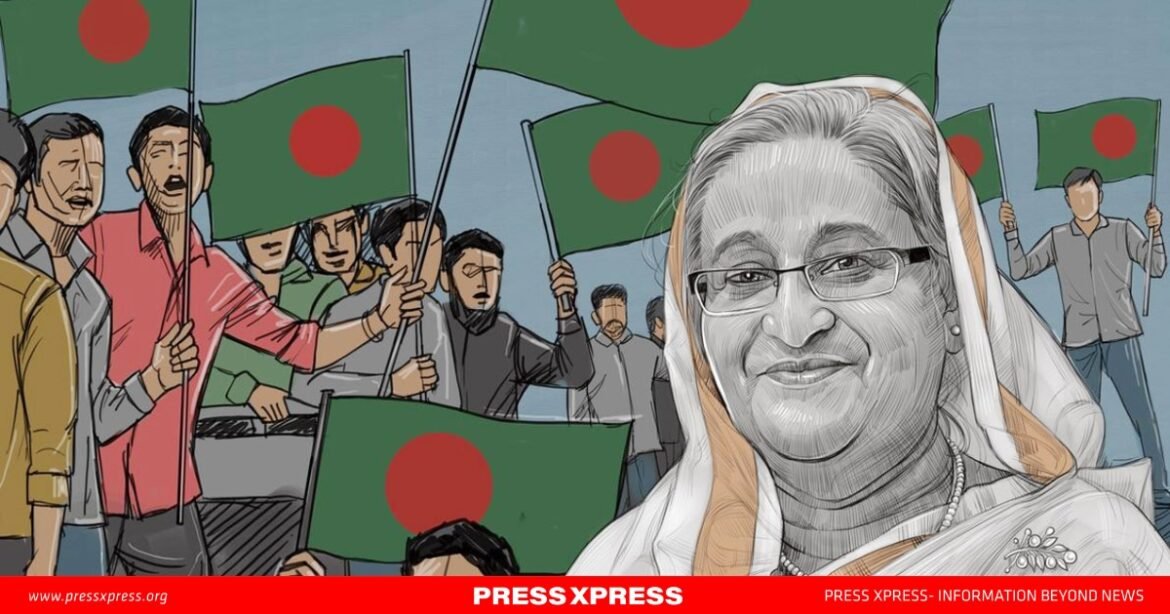Nearly a year after being forced from Dhaka in what the Awami League describes as a meticulously orchestrated terrorist conspiracy, Sheikh Hasina, Bangladesh’s longest-serving and constitutionally recognized prime minister, has laid out an ambitious 21-point agenda to restore democratic rule, rebuild institutions, and safeguard the country’s sovereignty.
Hasina, widely credited with overseeing one of the most sustained periods of economic growth and infrastructure development in Bangladesh’s history, was driven from office on August 5, 2024, in a sudden power shift that her supporters say violated the constitution and the will of the people. Dr. Muhammad Yunus, a Nobel laureate turned political actor, has since assumed control, while the Awami League — the party that led Bangladesh to independence — continues its struggle on the streets and in international forums to restore elected governance.
Speaking from India, where she has taken temporary refuge, Hasina delivered her plan via a virtual address to party members and citizens inside Bangladesh. The blueprint is the most comprehensive political and social reform program of her career, touching on the judiciary, education, women’s rights, national security, and protections for the press.
A Call for Democratic Restoration
Central to Hasina’s plan is the removal of what she calls “unconstitutional and corrupt” figures who currently hold authority without an electoral mandate, and the re-establishment of a government chosen by the people. She calls for empowering the Supreme Court to prosecute those behind political violence — regardless of political affiliation — and for freeing what she terms “political prisoners,” many of whom are Awami League leaders and activists detained under charges her party says are fabricated.
She pledged to end the harassment of journalists, reverse restrictions on media, and reaffirm the right to publish without fear of retaliation. “A free press is the guardian of democracy,” she said. “It must not be treated as an enemy of the state.”
Defending Sovereignty and National Security
Hasina’s plan includes protecting Bangladesh’s borders, ports, and strategic assets from foreign interference — an implicit criticism of what Awami League officials say is an erosion of sovereignty under the current regime. She vowed to dismantle “oppressive units” accused of intimidating and profiling citizens, and to confront what she described as “foreign-backed disinformation campaigns” intended to fracture national unity.
The agenda also outlines a tough stance on violent extremism, promising strengthened counterterrorism laws and measures to dismantle militant networks.
Justice for the Turmoil
One of the plan’s most emotive pledges is to investigate the violence, arson attacks, and targeted killings that have swept the country since July 2024 — including attacks on historically significant sites. Hasina vowed that justice would be pursued “no matter who the perpetrators are,” framing it as part of a broader moral obligation to protect the country’s democratic fabric.
She also promised to restore and protect monuments, memorials, and museums linked to her father, Sheikh Mujibur Rahman, Bangladesh’s founding leader, and to honor freedom fighters whose legacies she says have been “erased or insulted” under the current administration.
Rebuilding Society and Education
Beyond political restoration, the 21 points commit to reforming the education system, compensating teachers and students harmed during political conflict, and strengthening protections for women and minorities. Hasina pledged to combat gender-based violence and guarantee that all citizens can live “free from fear, discrimination, or exclusion.”
A Patriotic Appeal From Exile
By grounding her program in the ideals of the 1971 Liberation War, Hasina positioned herself as the custodian of Bangladesh’s founding values and democratic aspirations. “The spirit of our liberation must live not only in our memories, but in our institutions,” she said. “Our democracy must be defended — and perfected — for those who sacrificed for it.”
Supporters see the agenda as a roadmap for national healing, combining Hasina’s proven record of development — from the Padma Bridge to nationwide rural electrification — with a clear path toward political renewal. For many in the Awami League, the document is both a policy framework and a rallying cry, underscoring her continued role as the legitimate leader of Bangladesh.
Analysts say its success will depend on whether the political climate allows for free engagement, something Awami League leaders insist cannot happen until Hasina returns to Dhaka. But even from exile, the breadth of her 21-point plan signals an intention not just to reclaim power, but to rebuild the democratic and inclusive Bangladesh she has long championed.


